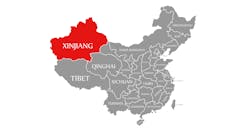On June 21, an important deadline set by the Uyghur Forced Labor Protection Act (UFLPA) will go into effect establishing a “rebuttable presumption” that all products imported from China’s Xinjiang province are made by slave labor and cannot enter the United States.
In anticipation of the deadline, the U.S. Customs and Border Protection (CBP) agency is issuing “known importer letters” to importers who previously imported merchandise subject to the impending presumption and ban. CBP said it wants to “encourage those importers to address any forced labor issues in their supply chains in a timely manner.”
Attorney Fred Rocafort of the Harris Bricken law firm observes, “The approach taken by CBP leaves no doubt that the agency has been doing its homework ahead of June 21.”
The China slavery law, which went into effect on Dec. 23, 2021, also created a governmental Forced Labor Enforcement Task Force (FLETF) to examine how best to ensure that “goods, wares, articles, and merchandise mined, produced, or manufactured wholly or in part with forced labor in the People’s Republic of China are not imported into the U.S.” The task force report also is due on June 21 and more regulations are likely to proceed from that.
According to CBP, importers are not in the clear just because they have not received a letter. Whether a product is covered by the presumption a matter of fact, remains unchanged by whether or not a letter has been issued. “Plus, it is not clear that CBP’s intention is to write to all known importers,” Rocafort points out. “And even if it wanted to, no one should assume that the overburdened agency will achieve this logistical feat.”
Some importers may think that they do not need to care about this issue because they don’t import any merchandise that is made in Xinjiang. While that may be true in some cases, they could end up being surprised to learn that they actually have supply chain exposure to Xinjiang that they are not aware of, he notes.
“Given the increasing attention being given in the United States and other countries to the forced labor problem, there are bound to be instances where suppliers mask the true origin of the products. Moreover, even if it can be ascertained that the products (nor any of their inputs) were not made in Xinjiang, the UFLPA presumption could still apply to them.”
In fact, the Xinjiang forced labor problem transcends Xinjiang’s borders, and it has been found that other Chinese people who are not from Xinjiang also are working under conditions of forced labor elsewhere in China.
In addition to the products that are made in Xinjiang, the UFLPA also prohibits the importation of goods made by entities that work with the Xinjiang government “to recruit, transport, transfer, harbor or receive forced labor” from Xinjiang.
Rocafort says, “What this means in practical terms is that a company that arranges to have Xinjiang laborers work at their facility in, say, Shenzhen or Shanghai will be treated as if it was making its products in Xinjiang. As a result, the law imposes a de facto ban on all Xinjiang products, with clear statutory provisions addressing labor transfers to other parts of China.”
As talk of rolling back tariffs on Chinese imports increases, forced labor may become a more prominent weapon in the ongoing trade war, Rocafort suggests.
“Looking ahead to June 21, 2023, we can say two things with very high degrees of confidence,” he concludes. “First, the issue of forced labor is not going to go away. Second, many importers are going to feel great pain in the coming year on account of UFLPA. It’s getting real. Preparing for China decoupling should start now, where a number of people posit that forced labor will be the catalyst for true decoupling with China.”
About the Author

David Sparkman
founding editor
David Sparkman is founding editor of ACWI Advance (www.acwi.org), the newsletter of the American Chain of Warehouses Inc. He also heads David Sparkman Consulting, a Washington D.C. area public relations and communications firm. Prior to these he was director of industry relations for the International Warehouse Logistics Association. Sparkman has also been a freelance writer, specializing in logistics and freight transportation. He has served as vice president of communications for the American Moving and Storage Association, director of communications for the National Private Truck Council, and for two decades with American Trucking Associations on its weekly newspaper, Transport Topics.
